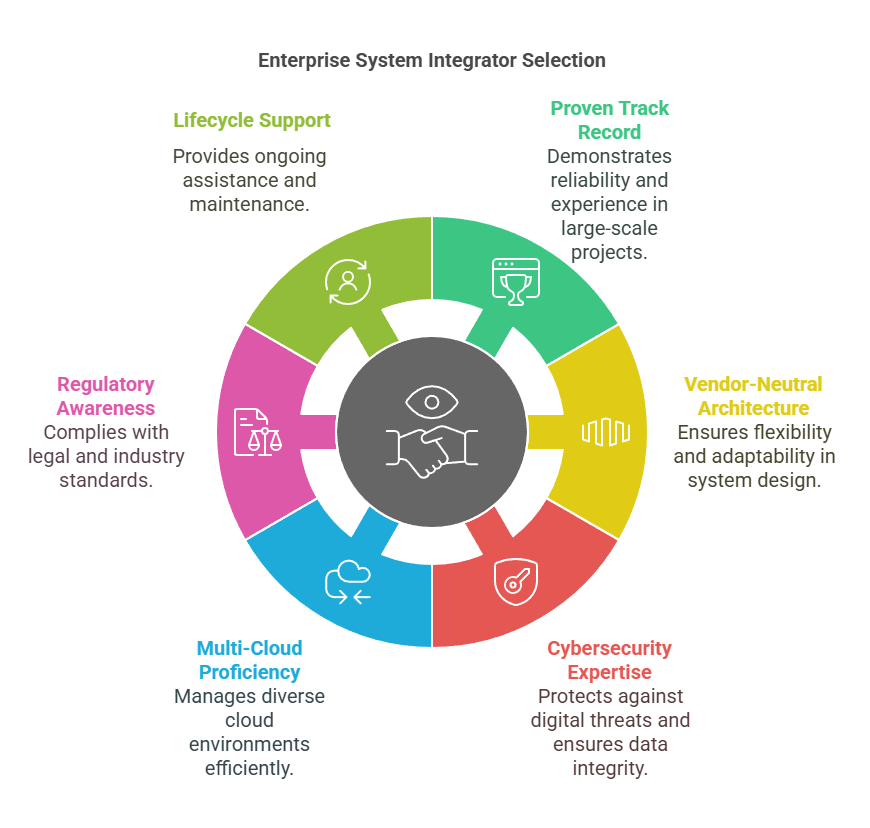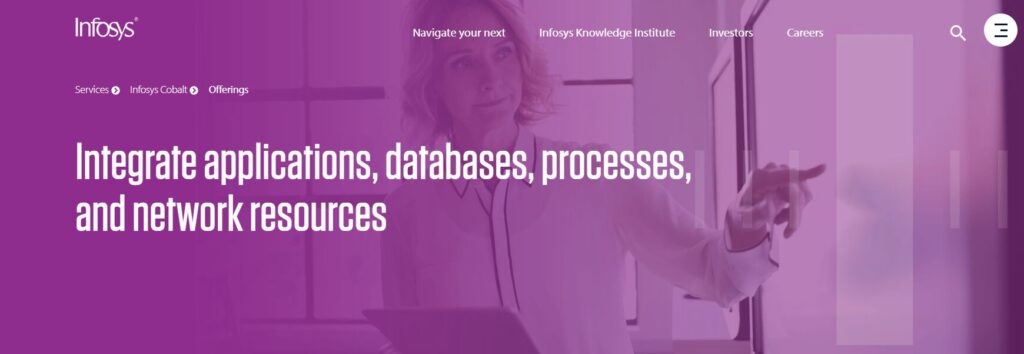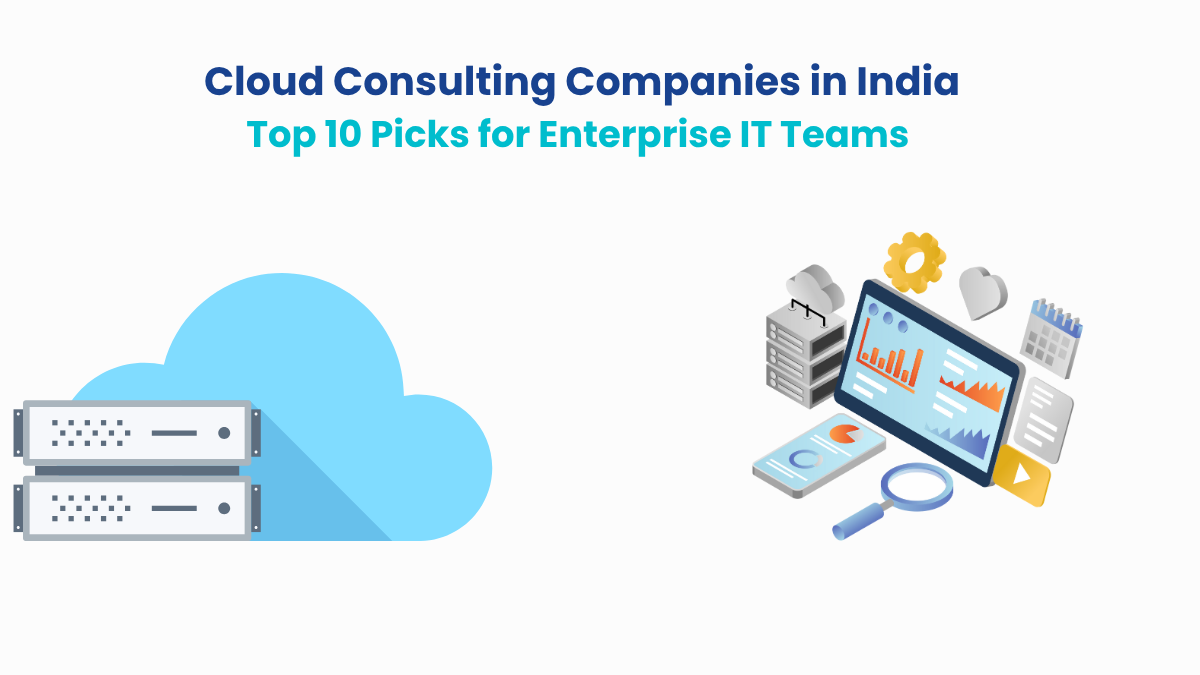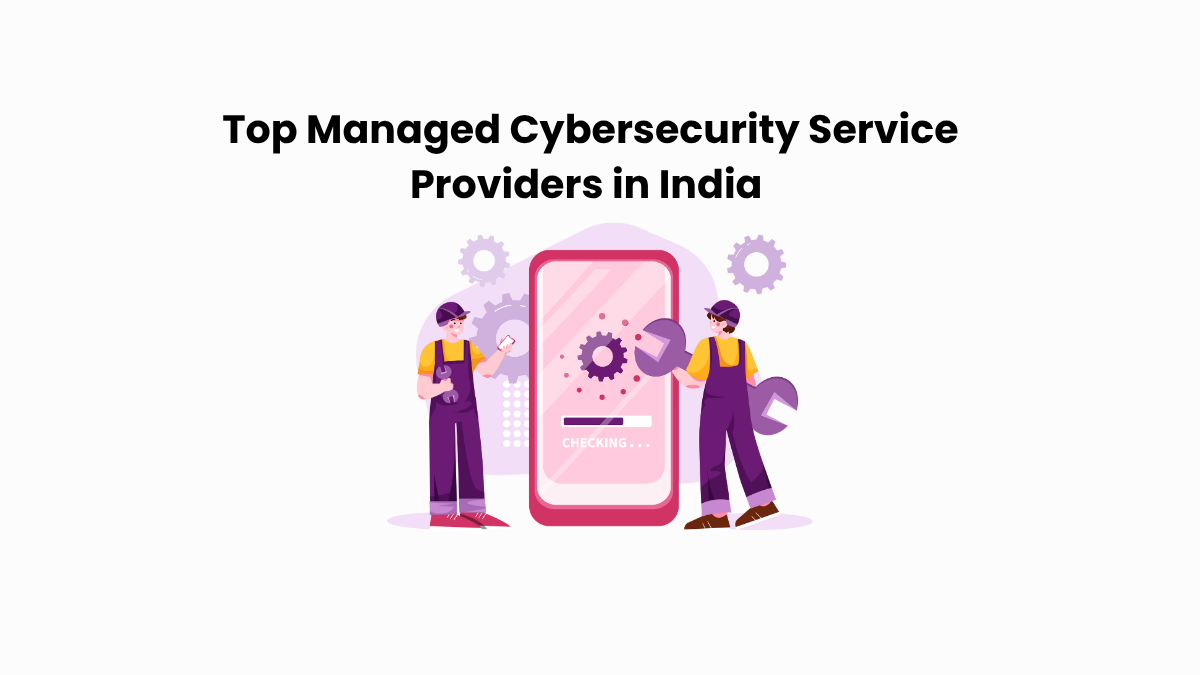Building enterprise systems today is not just about selecting the right technologies. It is about making those technologies work together seamlessly, securely, and at scale.
Many enterprises start by trying to integrate systems in-house. Very quickly, they encounter rising complexity, widening security gaps, and operational slowdowns that threaten business momentum.
As the layers of cloud, data, cybersecurity, and applications deepen, the cost of fragmented integration multiplies. Businesses face growing risks, mounting inefficiencies, and a serious competitive disadvantage.
At this point, enterprises realize the truth. Choosing the right system integrator is not a luxury. It is a strategic necessity that directly impacts resilience, innovation, and long-term growth.

The real challenge is this: How do you identify a partner capable of handling enterprise-grade complexity, security, and scale?
In this guide, we reveal the Top 10 System Integrator Companies in India trusted by leading enterprises in 2025. These are organizations that have demonstrated the expertise, precision, and execution discipline needed to drive modern integration success.
Before we dive into the list, let us first explore what factors enterprises must consider when selecting a system integrator.
What to Look for in Top System Integrator Companies in India for Enterprises?
Selecting a system integrator is not just about finding technical expertise. For enterprises, it is about finding a partner who understands the complexity, scale, and strategic demands of large-scale infrastructure.
Here are the essential factors enterprises must consider before choosing a system integrator service company:
#1. Proven Track Record with Enterprise-Scale Projects
Enterprises operate across complex ecosystems involving cloud platforms, legacy systems, security frameworks, and global operations. A true system integration partner must have demonstrated success in handling projects of similar scale and complexity. Case studies, enterprise references, and industry certifications can provide important validation here.
#2. Vendor-Neutral Architecture and Design
The best system integrators are not tied to a single vendor’s technologies. They recommend solutions that best fit the enterprise’s goals, security posture, and operational requirements. Vendor neutrality ensures the integration is scalable, adaptable, and not locked into rigid ecosystems.

#3. Deep Cybersecurity Expertise
Enterprises require integrators who embed Zero Trust principles, encryption standards, identity management, and compliance controls directly into system blueprints. Weak security in integration exposes enterprises to regulatory penalties, data breaches, and operational risks.
#4. Multi-Cloud and Hybrid Cloud Proficiency
Modern enterprises rarely operate on a single platform. Integration partners must demonstrate fluency in connecting public cloud services, private cloud infrastructure, and on-premise systems into seamless, secure environments. Without multi-cloud proficiency, enterprises face fragmentation, inefficiency, and escalating management overhead.
Related Resource: For a deeper look at how to modernize security operations and integration frameworks across hybrid environments, download our Five Essential Steps to SOC Transformation guide. It offers practical steps for consolidating tools, automating incident response, and building resilient, scalable security architectures.

#5. Regulatory and Compliance Awareness
Large organizations must meet standards like GDPR, HIPAA, SOX, and industry-specific compliance mandates. A qualified system integrator must design architectures that align with compliance from day one, not as an afterthought. This reduces legal exposure and accelerates audit-readiness.
6. End-to-End Lifecycle Support
Integration does not end after deployment. Enterprises need partners who offer ongoing monitoring, performance optimization, incident response, and continuous integration improvements. Without strong lifecycle support, systems can degrade, vulnerabilities can grow, and business continuity can be compromised.
Choosing the right system integrator is a long-term strategic investment. It defines how resilient, scalable, and secure an enterprise’s digital operations will be.
For a detailed checklist on how to evaluate system integrators, explore our full guide: 9 Factors to Look for in a System Integration Company.
With these critical factors in mind, the next step is to identify system integrators that meet the enterprise standard. Here are the top 10 companies offering proven system integration services for enterprises in India, starting with Datacipher.
#1. Datacipher Solutions – Delivering Enterprise-Grade System Integration Across India and APAC
Datacipher specializes in transforming complex enterprise networking, cybersecurity, cloud, and infrastructure challenges into streamlined, scalable solutions. With over 650 successful projects and a 90%+ customer satisfaction rate, we have built a reputation for excellence across India and the broader APAC region.
The company serves enterprises that demand high-performance, future-ready integration across multi-vendor, hybrid environments.

Source – Datacipher
Datacipher’s expertise lies in engineering modular, secure, and vendor-neutral architectures that integrate cloud, data center, network, and cybersecurity systems into cohesive operational frameworks.
As a trusted partner of Juniper Networks and Palo Alto Networks, Datacipher brings world-class technologies into practical, future-ready enterprise deployments. We have successfully delivered integration projects across sectors, including telecommunications, automotive, media, and healthcare. Our case studies, like the ones depicted below, illustrate Datacipher’s ability to execute at scale while meeting stringent performance and security benchmarks.
For enterprises seeking future-proof integration across multi-vendor ecosystems, Datacipher brings disciplined execution, security-by-design frameworks, and a deep understanding of enterprise operational needs.
System Integration Capabilities
Our core system integration services include:
- Enterprise Networking Integration: Design and deployment of WAN, LAN, WiFi6, 5G, SD-WAN, and network automation frameworks tailored for high-availability environments. Our solutions are architected for scalability, visibility, and operational efficiency, with specific success in sectors such as telecom and manufacturing.
- Cloud and Data Center Integration: We specialize in hybrid and multi-cloud architecture design, storage optimization, edge computing integration, and end-to-end cloud migration.
- Cybersecurity Integration: We also offer deployment of Zero Trust architectures, Secure Access Service Edge (SASE) models, endpoint protection, and next-generation firewall ecosystems. As a strategic partner of Palo Alto Networks, Datacipher embeds cybersecurity controls from the architecture design phase itself.
- Infrastructure Management and Resident Engineering: We provide ongoing management, proactive incident response, and network resident engineering services to ensure integrated environments remain optimized and secure over the long term. Moreover, Datacipher’s Managed Services offerings support both greenfield projects and complex legacy modernization efforts.
With a focus on security-first architectures, multi-vendor expertise, and real-world execution at scale, Datacipher continues to set a high standard for enterprise system integration in India.
While Datacipher remains a leading choice for organizations seeking future-ready integration, several other providers have also demonstrated strong capabilities.
Let us now explore the other top system integrator companies that enterprises are partnering with in 2025.
#2. Tata Consultancy Services
Tata Consultancy Services (TCS) supports enterprises in modernizing IT environments by integrating legacy systems with next-generation cloud, network, and security platforms. Their approach emphasizes building agile, scalable architectures by leveraging technologies like software-defined networking (SDN), network function virtualization (NFV), and cloud-managed infrastructure.

Source – TCS
The company’s system integration services cover advanced intrusion prevention, application visibility, URL filtering, and centralized access management, enabling faster deployment cycles and stronger regulatory compliance.
Through strategic partnerships with providers like Cisco, Juniper, Palo Alto, and Checkpoint, TCS integrates multi-vendor ecosystems into cohesive operational frameworks.
Their consulting-led model ensures that integration programs align directly with enterprise transformation goals, delivering greater operational agility and long-term cost efficiency.
#3. Wipro Limited
Wipro delivers system integration services that help enterprises modernize IT infrastructure, unify digital platforms, and accelerate transformation across industries. Their offerings span network integration, cloud-native architecture, and application modernization.

Source – Wipro
Wipro’s Digital Integration as-a-Service (DIaaS) enables hybrid cloud integration through an API-first, microservices-based platform. It reduces time-to-market by over 50% and supports both on-premises and cloud environments.
In manufacturing, Wipro PARI integrates MES, ERP, SCADA, and plant IT systems to enhance real-time visibility and operational efficiency. For telecom and network edge providers, Wipro offers SDN/NFV-based system integration, OSS/BSS transformation, and unified NOC services, facilitating end-to-end service delivery and automation.
Additionally, Wipro’s “Integration Services in a Box” provides prebuilt connectors, API management, and containerized services, enabling rapid ecosystem integration and digital agility.
#4. Infosys Limited
For enterprises dealing with fragmented legacy systems and emerging cloud ecosystems, Infosys provides integration strategies centered on flexibility and interoperability. Rather than forcing standardized solutions, Infosys builds modular architectures where legacy applications, new cloud services, and data platforms operate cohesively.

Source – Infosys
Their system integration work often revolves around enabling real-time data access across distributed environments, simplifying multi-cloud management, and orchestrating hybrid application ecosystems.
By using APIs, microservices, and event-based frameworks, Infosys helps enterprises move from rigid infrastructures to agile, service-driven models.
Their Integration programs are tailored to industry-specific demands, whether it involves unifying digital supply chains, enabling faster financial reporting, or connecting customer engagement platforms across markets.
#5. HCLTech
At HCLTech, system integration is increasingly driven by the convergence of digital applications, intelligent automation, and hybrid cloud environments.
Rather than focusing purely on cloud migration, HCLTech integrates platforms by embedding API connectivity, robotic process automation, and event-driven architectures from the ground up.

Source – HCLTech
Their digital integration services enable enterprises to streamline data flows between internal systems and external partners, modernize EDI/B2B infrastructures, and orchestrate multi-cloud deployments with real-time visibility.
By combining automation, low-code integration, and dynamic API frameworks, HCLTech focuses on reducing integration complexity while enabling faster innovation cycles across industries like banking, retail, and manufacturing.
#6. Capgemini
Capgemini helps enterprises build unified, agile IT ecosystems by integrating applications, data platforms, and hybrid cloud environments. Their system integration services emphasize API-led modernization, event-driven architectures, and intelligent data connectivity to streamline digital operations.

Source – Capgemini
Through its Core Integration Framework, Capgemini simplifies connecting legacy systems with modern cloud-native platforms, enabling enterprises to accelerate application development and improve real-time data access.
Their Enterprise Management solutions focus on rationalizing IT estates by integrating infrastructure, applications, and operational layers into cohesive, adaptable platforms.
By aligning system integration programs closely with business objectives, Capgemini supports enterprises in scaling digital innovation while reducing operational complexity and improving interoperability.
#7. Cognizant
Cognizant specializes in integrating enterprise platforms, cloud environments, and operational systems to help organizations build agile, scalable IT ecosystems. Their system integration capabilities center around reusable APIs, modular architectures, and cloud-native connectivity, enabling faster digital transformation without disrupting legacy foundations.

Source – Cognizant
Cognizant also supports B2B integration at scale through cloud-managed services, helping enterprises connect supply chains, customer platforms, and partner ecosystems with minimal operational overhead.
In industries like life sciences, Cognizant’s system integration programs link data infrastructure, lab informatics, and manufacturing execution systems to streamline operations and accelerate regulatory compliance.
Their approach strikes a balance between modernization and operational continuity, making Cognizant an ideal partner for enterprise-grade integration initiatives.
#8. Aspire Systems
Aspire Systems approaches enterprise system integration with a strong emphasis on speed, cloud readiness, and operational continuity. They help organizations unify applications, data, and workflows across hybrid environments by combining cloud-native designs with pre-built integration accelerators.

Source – Aspire Systems
Their AURAS integration framework provides reusable templates and utilities that shorten deployment timelines and reduce complexity for enterprise projects.
In addition, Aspire offers managed integration services and continuous testing frameworks to ensure system resilience, performance, and compliance over time.
This combination of automation, expertise, and platform partnerships positions Aspire as a trusted partner for accelerating enterprise digital transformation.
#9. NTT DATA
NTT DATA delivers comprehensive system integration services that enable organizations to modernize their IT landscapes and drive digital transformation. Their approach focuses on integrating applications, data, and processes across hybrid environments to enhance operational efficiency and agility.

Source – NTT Data
Their Application Integration Platforms offer services including architecture design, platform evaluation, and governance to optimize system connectivity. NTT DATA’s expertise in middleware platform implementation ensures scalable and secure integration solutions tailored to business needs.
Additionally, NTT DATA provides managed integration services, offering 24/7 support for monitoring, maintenance, and continuous integration/continuous delivery (CI/CD) pipelines to ensure seamless operations. Their intelligent automation and workflow orchestration services utilize technologies such as robotic process automation (RPA) to streamline processes and minimize manual effort.
By aligning integration solutions with business objectives, NTT DATA helps enterprises achieve scalable, secure, and future-ready IT ecosystems.
#10. Microland
Microland focuses on integrating enterprise IT infrastructures with a specialization in network automation, cloud connectivity, and hybrid environment optimization. Their system integration services help enterprises modernize legacy networks, unify cloud and on-premises architectures, and automate operations across distributed ecosystems.

Source – Microland
Microland’s Intelligeni NetOps platform enables intelligent network management by embedding automation, monitoring, and predictive analytics into daily operations.
By combining network transformation with cloud orchestration and operational resilience strategies, Microland enables enterprises to achieve seamless connectivity, enhanced visibility, and scalable integration across digital platforms.
The system integrators we explored above underscore the critical importance of integration excellence to enterprise resilience and innovation. The right partner does not just integrate technologies. They future-proof operations, secure environments, and align IT with business growth.
For enterprises seeking a trusted integration partner with proven execution strength across India and the APAC region, Datacipher stands ready.
Why Datacipher Stands Among the Leading System Integrator Companies in India?
Datacipher is trusted by enterprises across India and the APAC region to deliver system integration programs that drive resilience, innovation, and growth. With over 650 successful projects spanning telecommunications, manufacturing, finance, and media, Datacipher has established itself as a leader among system integrator companies in India.
Our approach goes beyond connecting technologies. We engineer future-ready architectures that unify cloud platforms, modernize networks, embed cybersecurity, and optimize hybrid infrastructure environments.
Across our case studies, from delivering high-performance SD-WAN deployments for telecom leaders to executing Zero Trust security frameworks for global manufacturing firms, Datacipher consistently demonstrates disciplined execution, business-aligned integration strategies, and measurable impact.

Our core enterprise system integration services include:
- Multi-vendor network integration across WAN, LAN, WiFi6, and SD-WAN frameworks.
- Cloud integration and hybrid data center modernization.
- Cybersecurity architecture deployment, including SASE and Zero Trust models.
- Infrastructure automation, managed services, and network resident engineering.
Datacipher’s vendor-neutral design philosophy, proven large-scale delivery capability, and strong industry partnerships with Juniper Networks and Palo Alto Networks position us as a strategic integration partner for enterprises seeking secure, scalable digital transformation.
Reach out to our experts today to discuss how we can help future-proof your enterprise infrastructure through seamless, secure, and scalable system integration.
Frequently Asked Questions
1. What does a system integrator company do?
A system integrator connects, optimizes, and secures diverse IT systems, such as cloud platforms, networks, applications, and data centers, into one unified environment that supports enterprise operations.
2. Why should enterprises in India hire a system integrator?
Enterprises today face growing hybrid IT complexity. Hiring a system integrator ensures seamless integration, strengthens cybersecurity, improves operational efficiency, and accelerates digital transformation at scale.
3. What are the biggest challenges in system integration projects?
Common challenges include vendor lock-in, cloud migration complexity, cybersecurity vulnerabilities, compliance gaps, and operational fragmentation. Learn more about system integration challenges and how to overcome them here.
4. Can system integrators handle multi-cloud and hybrid environments?
Yes. Top system integrators like Datcipher specialize in building architectures that securely connect public clouds, private clouds, and legacy on-premises systems into cohesive hybrid environments.
5. Do system integrators also manage cybersecurity?
Leading integrators embed security from the ground up. For instance, at Datacipher, we implement Zero Trust models, encryption frameworks, identity management, and compliance-driven architectures during system design.
6. When should enterprises outsource system integration instead of doing it in-house?
Outsourcing system integration becomes the strategic choice when enterprises face internal skill gaps, multi-vendor complexity, aggressive deployment timelines, or regulatory pressures. External integration partners bring proven frameworks, deep expertise in vendor ecosystems, automation best practices, and compliance assurance, thereby minimizing operational risks and delays. Building complex integrations in-house without specialized capabilities often leads to fragmentation, security vulnerabilities, and missed business objectives. Explore a detailed comparison of in-house versus outsourced system integration here.





